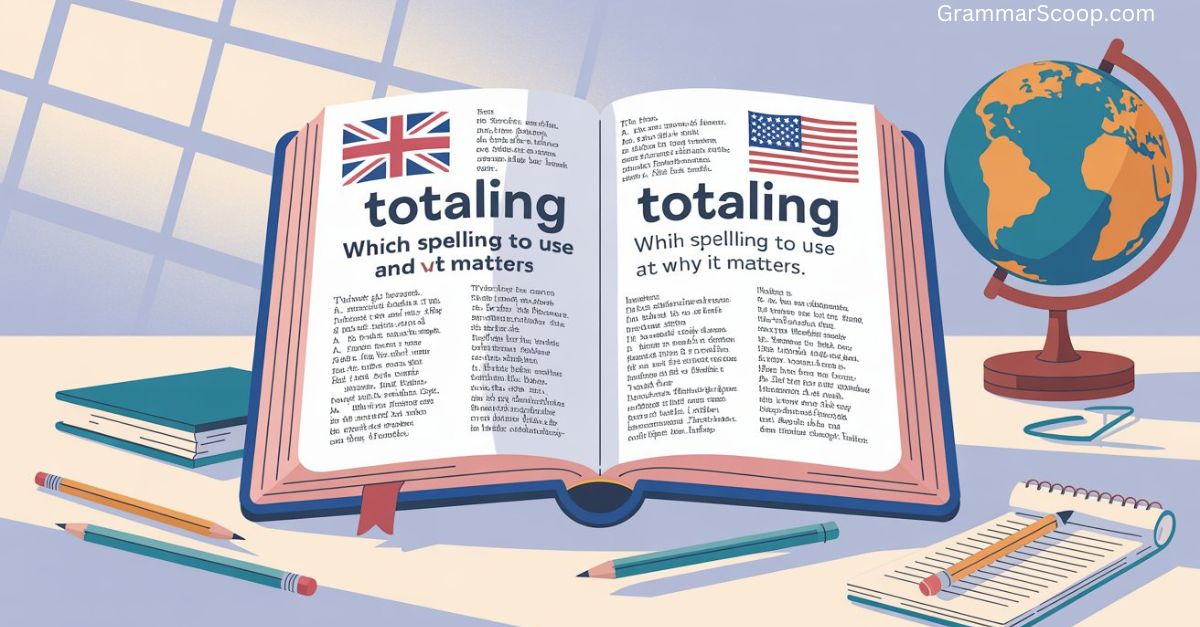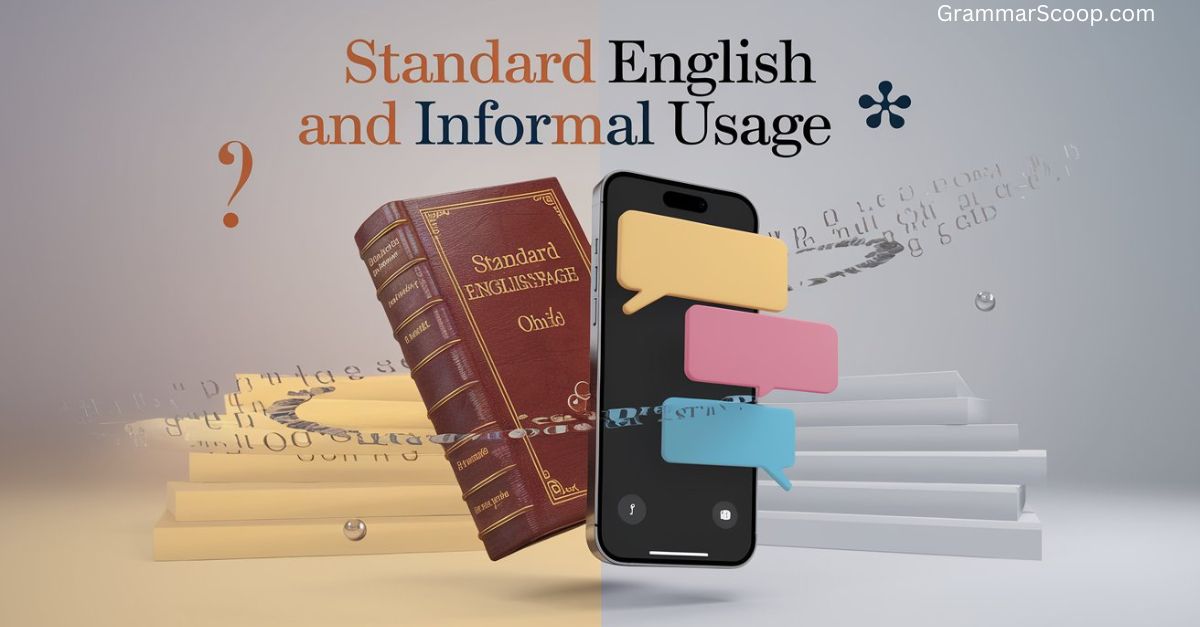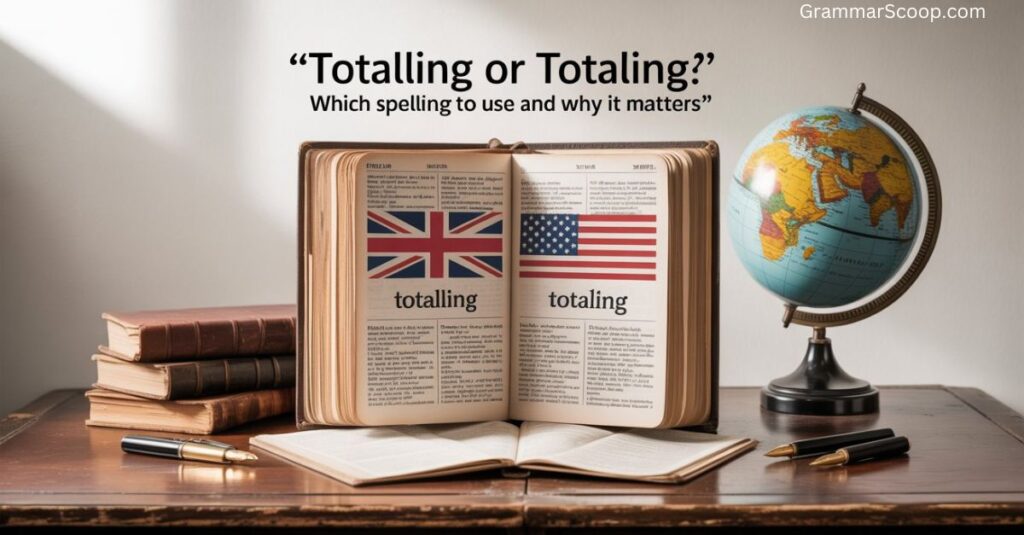Understanding whether to use totalling or totaling can feel like walking a tightrope between two dictionaries. The confusion isn’t just about letters—it’s about geography, grammar rules, and the evolution of the English language. In this in-depth guide, you’ll uncover the full story behind the totalling vs totaling debate, including usage tips, rules, and real-world examples.
Quick Summary
Totalling vs totaling is a classic example of how British English and American English diverge in spelling. While both forms mean the same—adding up numbers or calculating a total—the difference lies in regional spelling rules. Totalling follows the double l spelling rule in British English, whereas totaling sticks to the single l spelling preferred in American English. Knowing when to use each depends on your audience, location, and style guide. In short, totalling is British, totaling is American, and both are grammatically correct depending on the context.
Read More: Cancelation or Cancellation: Which Spelling is Correct?
Totalling or Totaling – Same Meaning, Different Flags
The verb to total means to add numbers together to find a sum. It’s a simple concept used in many everyday and professional tasks, especially when dealing with quantities or calculations.
Definition of the Verb To Total
To total something means to calculate the complete amount or sum of various figures or parts. It is commonly used as a verb in the present participle form as totalling or totaling, depending on the spelling convention.
Example Definition:
To total = to add up; to calculate the overall amount.

Common Contexts for Using To Total
The verb appears in a range of industries and contexts, especially where numbers, values, or data are involved:
- Finance:
- “Expenses totalling £5,000 were submitted for approval.”
- Used in budget reports, expense tracking, and accounting documents.
- Mathematics:
- “Add the numbers to get a result totaling 48.”
- Frequently used in arithmetic operations and statistics.
- Insurance:
- “The car was declared a total loss, with damages totaling $12,000.”
- Common in claim assessments and damage evaluations.
- Retail & Sales:
- “Orders totalling over $10,000 were placed during the sale.”
- Used in invoices, sales summaries, and checkout totals.
- Construction & Projects:
- “The project costs totalling £2 million were within the planned budget.”
- Appears in estimates, contracts, and project reports.
Clarifying the Confusion
Although totalling or totaling look slightly different, they mean exactly the same thing. The only difference lies in regional spelling rules:
- Totalling is the correct spelling in British English (used in the UK, Australia, and most Commonwealth countries).
- Totaling is the correct spelling in American English (used in the US and often in international tech or business documents).
British vs American English

The spelling difference between totalling and totaling boils down to the classic split between British English vs American English.
British English
- In the UK, it’s common to double the consonant before adding -ing or -ed to verbs ending in a consonant preceded by a single vowel.
- That’s why you’ll see travelling, cancelled, and yes—totalling.
American English
- The US version often simplifies spelling by dropping the double l, sticking to forms like traveling, canceled, and totaling.
- This trend dates back to Noah Webster’s 19th-century spelling reforms aimed at simplifying American English.
| Word Root | British English | American English |
|---|---|---|
| total | totalling | totaling |
| travel | travelling | traveling |
| cancel | cancelling | canceling |
So, “totalling or totaling”? It depends on your audience.
Totaling or Totalling – Spelling Rules Behind the Split
To understand the grammar, let’s break down the spelling conventions that govern this.
British Spelling: Doubling the “l”
In British grammar, a consonant is doubled when:
- The word ends in a single vowel followed by a single consonant
- The stress is on the final syllable
Examples:
- “begin” → “beginning”
- “occur” → “occurring”
Even though the stress in “total” is on the first syllable (TO-tal), British spelling still tends to double the “l” before adding -ing: totalling.
American Spelling: Simplified Rule
In American English, the preference is to avoid doubling unless absolutely necessary. If the stress isn’t on the last syllable, the “l” often remains single: totaling.
This creates consistent, streamlined spelling.
Why People Get Confused – Common Usage Errors
When it comes to totaling vs totalling, many writers get tripped up—not because they don’t know the meaning, but because technology and global communication blur the lines between spelling norms.
Spellcheck and Autocorrect: Cross-Regional Friction
Most word processors and writing tools like Microsoft Word, Google Docs, and Grammarly come preset to American English. This default setting often flags British spellings like totalling, travelling, or cancelled as “errors,” even though they are perfectly correct in British English.
Example:
You type “totalling” in a British English report, but your US-based software underlines it in red and suggests “totaling.”
This not only creates confusion but also subtly pressures writers to adopt American English, even if they’re writing for a British audience.
US-Dominated Tech Platforms Shape Global Writing
From social media platforms to email clients and even AI tools, much of the digital writing landscape is built on US spelling conventions. This can create subconscious shifts in how people spell, especially in countries where English is a second language or where British English is taught, but US tools are used.
Quote from a language expert:
“American tech companies have exported not just software—but spelling conventions.”
— Dr. Emily Norris, Linguistics Professor
Examples of Real-World Confusion
Let’s look at some common places where totalling vs totaling causes mix-ups:
Business Emails
- A UK employee sends a report with “totalling £3,000” to a US client.
- The client replies, suggesting the spelling is wrong.
Academic Papers
- A student in India writes “totalling” in a thesis for a US university.
- The professor marks it incorrect, not realizing it’s British spelling.
Social Media
- Users often correct each other’s spelling in comment sections without realizing that both forms are correct, just regional.
Clarification: Neither is Wrong
Let’s clear the air:
Totalling is correct in British English, and totaling is correct in American English.
There’s no “wrong” spelling here—just different standards based on where you’re writing and who you’re writing for. The key is consistency. Pick one based on your audience or style guide and stick with it throughout your content.
Real Case Example:
A UK-based consultant writes a report for a US tech firm. The document uses British spellings like “totalling” and “labour”. The client requests edits to match American spelling, highlighting the importance of knowing your audience.
When Should You Use Totalling or Totaling?
Here’s a handy cheat sheet to help you decide:
| Writing Context | Use “Totalling” | Use “Totaling” |
|---|---|---|
| UK Business Docs | Right | Wrong |
| US Academic Paper | Wrong | Right |
| Australian Content | Right | Wrong |
| Global Blog (US audience) | Wrong | Right |
| Global Blog (UK audience) | Right | Wrong |
| Mixed Global Teams | Contextual | Contextual |
Tip: Follow the style guide if one is provided. APA, Chicago, or MLA usually favor American spelling unless otherwise specified.
Sentence Examples to Show Real-World Use
Sentences Using “Totalling” (British)
- “Expenses totalling nearly £5,000 were filed last week.”
- “He brought documents totalling over 200 pages.”
Sentences Using “Totaling” (American)
- “She submitted receipts totaling $1,250 for reimbursement.”
- “Damages totaling $4 million were reported.”
Synonyms for Totalling and Totaling
To avoid repetition or tailor your tone, here are useful synonyms:
- Adding up
- Summing
- Tabulating
- Tallying
- Counting
- Aggregating
- Computing
- Calculating total
Example Rewrites
- “Expenses adding up to £1,200 were approved.”
- “Sales summed to over $10,000.”
READ MORE:
The Global Writing Tip – Choose Based on Your Audience
Consistency is key. Switching between “totalling” and “totaling” in one document is jarring. Pick one and stick with it.
Professional Settings
- Match your client or publication’s regional language style.
- Tools like Grammarly, Hemingway, or even Google Docs can help you switch between English (UK) and English (US) settings.
Academic Writing
- UK universities accept “totalling.”
- US institutions prefer “totaling.”
- Always check the style guide or academic standard.
Digital Content
- If you’re writing for a US audience, use totaling.
- For a UK-centric readership, go with totalling.
Pro Tip: Use browser extensions to lock in your preferred English variant.
Quick Recap – Totalling vs Totaling
Here’s the bottom line:
- Both are correct, just used in different regions.
- Totalling is used in British English.
- Totaling is used in American English.
- The spelling difference reflects broader rules around double l spelling vs single l spelling.
- Always choose the form that matches your audience and style guide.
FAQs
- What does totalling mean?
It means adding up numbers to get a sum, commonly used in British English.
- How do you use totaling in a sentence?
“He listed expenses totaling over $3,000 for tax purposes.”
- Which is correct, totalled or totaled?
Both are correct. Use totalled in British English and totaled in American English.
- Why does British English double the “l”?
British English follows a grammar rule of doubling consonants before suffixes if the stress is on the final syllable or when using some vowel-consonant combinations.
- Can I mix totalling and totaling in one document?
Avoid mixing. Stay consistent with either British or American spelling throughout.
Conclusion
The difference between totaling or totalling might be small, but it carries weight in professional and academic settings. Choosing the correct form hinges on knowing your audience and aligning with their language norms. When in doubt, consult the style guide, set your software to the right language variant, and keep your spelling consistent.
So, next time you’re adding up numbers, you won’t just get the sum right—you’ll get the spelling spot on too.

Lisa Morris is a seasoned blogger and language enthusiast with a passion for making grammar simple and engaging. At Grammar Scoop, she shares clear, concise tips that help readers master the rules of English with confidence.






